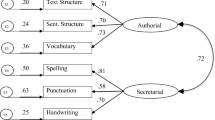Abstract
This article presents practical, research-based strategies for parents to use when reading with their child. The intended audience is classroom teachers and reading specialists who work with parents of the children they teach. Each strategy provides supporting research, followed by a description of how the strategy can be implemented by parents. The strategies presented are (a) establish a routine, (b) make reading an enjoyable experience, (c) read often, (d) reread favorite books, (e) bridge the language between the book and the child, (f) pay attention to the clues your child is giving you, (g) talk about the print, (h) read various types of books, (i) engage the child in analytic talk, and (j) encourage book-related play.
Similar content being viewed by others
REFERENCES
Adams, M. J. (1990). Learning to read: Thinking and learning about print. Cambridge, MA: MIT Press.
Baer, E. (1995). This is the way we eat our lunch: A book about children around the world. New York: Scholastic.
Baker, L., Mackler, K., Sonnenschein, S., & Serpell, R. (2001). Parents' interactions with their first-grade children during storybook reading and relations with subsequent home reading activity and reading achievement. Journal of School Psychology, 39, 415.
Bayer, J. (1984). A my name is Alice. New York: E.P. Dutton.
Burleigh, R. (2003). Home run. Singapore: Harcourt Brace.
Bus, A. G. (2001). Joint caregiver-child storybook reading: A route to literacy development. In S. B. Neuman & D. K. Dickinson (Eds.), The handbook of early literacy research (pp. 179–191). New York: Guilford Press.
Bus, A. G., & Sulzby, E. (1996). Becoming literate in a multicultural society. In: J. Shimron (Ed.), Literacy and education: Essays in memory of Dina Feitelson (pp. 31–45). Cresskill, NJ: Hampton Press.
Bus, A. G., & van IJzendoorn, M. H. (1988). Mother-child interactions, attachment, and emergent literacy: A cross-sectional study. Child Development, 59, 1262–1272.
Bynum, J. (1999). Altoona baboona. San Diego: Harcourt Brace.
Cannon, J. (1993). Stellaluna. New York: Harcourt Brace.
DeJong, M. T., & Bus, A. G. (2002). Quality of book-reading matters for emergent readers: An experiment with the same book in regular and electronic format. Journal of Educational Psychology, 94, 145–155.
Dickinson, D. K., & Smith, M. W. (1994). Long-term effects of pre-school teachers' book readings on low-income children's vocabulary and story comprehension. Reading Research Quarterly, 29, 105–122.
Edwards, P. D. (1996). Some smug slug. New York: HarperCollins.
Ehlert, L. (1989). Eating the alphabet: Fruits and vegetables from A to Z. San Diego: Harcourt, Inc.
Ehlert, L. (1991) Red leaf, yellow leaf. Singapore: Harcourt Brace.
Jones, R. (1996). Emerging patterns of literacy. A multi-disciplinary perspective. London: Routledge.
Justice, L. M., & Ezell, H. K. (2002). Use of storbook reading to increase print awareness in at-risk children. American Journal of Speech-Language Pathology, 11, 17–29.
Morrow, L. M. (1988). Young children's responses to one-to-one story readings in school settings. Reading Research Quarterly, 23, 89–107.
Pappas, C. (1991). Young children's strategies in learning the “book language” of information books. Discourse Processes, 14(2), 203–225.
Reese, E., & Cox, A. (1999). Quality of adult book reading affects children's emergent literacy. Developmental Psychology, 35, 20–28.
Rey, H. A. (1963) Curious George learns the alphabet. New York: Houghton Mifflin.
Scarborough, H., & Dobrich, W. (1994). On the efficacy of reading to preschoolers. Developmental Review, 14, 245–302.
Sendak, M. (1962) Alligators all around. New York: HarperCollins.
Seuss, Dr. (1963). Dr. Seuss's ABC. New York: Random House.
Seuss, Dr. (1974). There's a wocket in my pocket. New York: Random House.
Shannon, T. M. (2002) Tub toys. Berkeley, CA: Tricycle Press.
Snow, C., Dubber, C., & De Blauw, A. (1982). Routines in mother-child interaction. In L. Feagans & D. C. Farran (Eds.), The language of children reared in poverty (pp. 53–71). New York: Academic Press.
Teale, W. H. (1986). Home background and young children's literacy development. In W. H. Teale and E. Sulzby (Eds.), Emergent literacy (pp. 173–206). Norwood, NJ: Ablex.
Vygotsky, L. S. (1978). Mind in society: The development of higher psychological processes. Cambridge, MA: Harvard University Press.
Wasik, B. A., & Bond, M. A. (2001). Beyond the pages of a book: Interactive book reading and language development in preschool classrooms. Journal of Educational Psychology, 93(42), 243–250.
Rights and permissions
About this article
Cite this article
Partridge, H.A. Helping Parents Make the Most of Shared Book Reading. Early Childhood Education Journal 32, 25–30 (2004). https://doi.org/10.1023/B:ECEJ.0000039640.63118.d4
Issue Date:
DOI: https://doi.org/10.1023/B:ECEJ.0000039640.63118.d4




